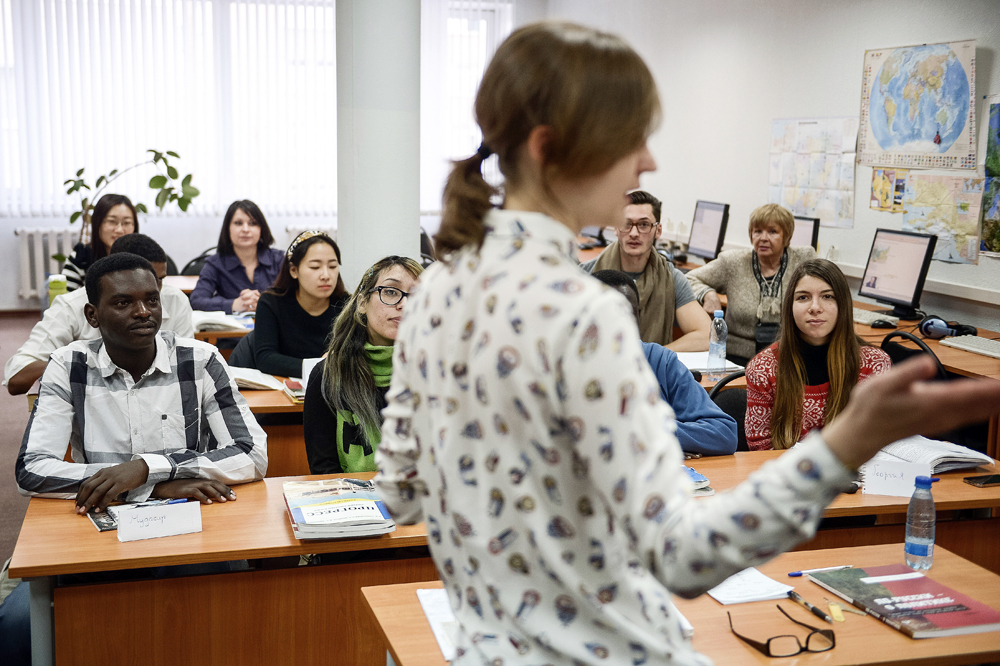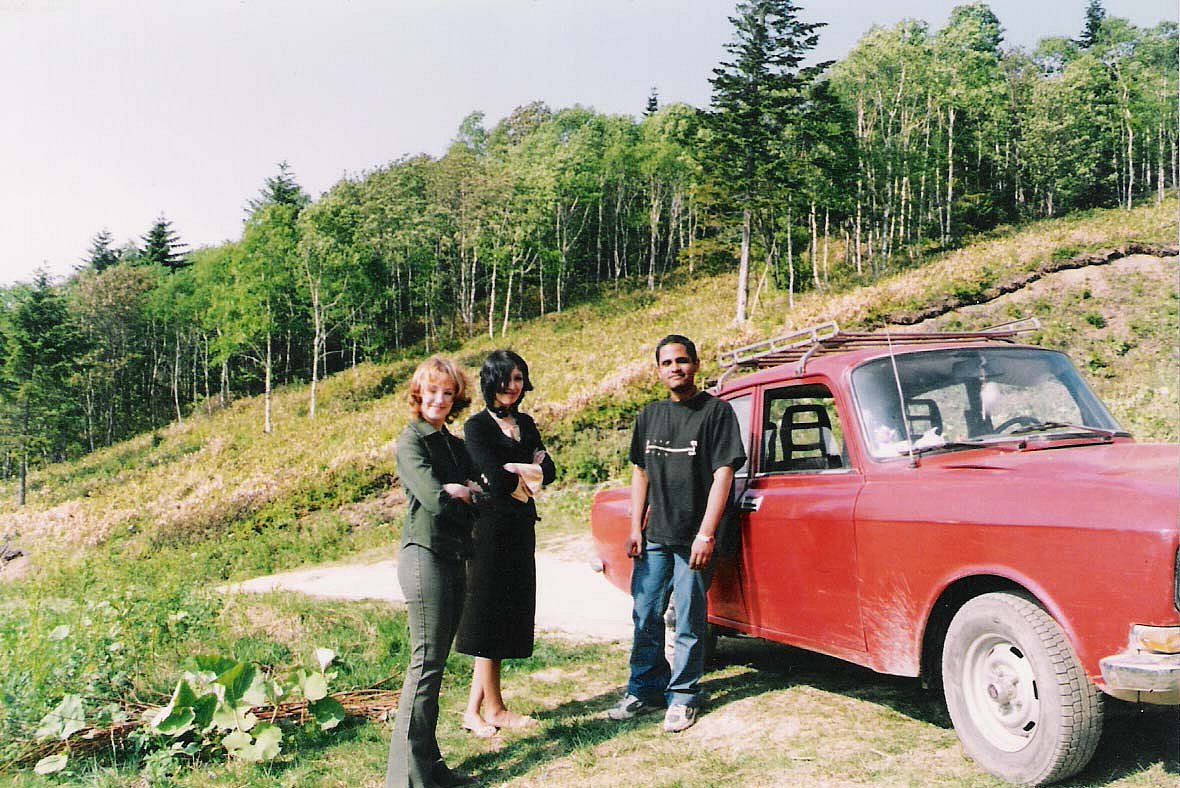How I studied Russian

Students attending the Russian language lesson at the People's Friendship University in Moscow.
Grigoriy Sisoev / RIA NovostiGrammar, grammar and once again, grammar!
Nick Holdsworth, UK-based editor and journalist
When I first came to Russia in 1991, I taught myself the alphabet and studied a BBC phrase book. My first sentence in Russian – “red caviar doesn’t cost that much” - only got me into trouble at a sumptuous lunch a friend hosted.
Chenoa Davidson from the UK, EFL teacher in Poland
If you speak Russian without knowing how to use the cases in a vaguely coherent way, it is basically nonsense. So I would advise anyone learning Slavic languages to focus on grammar in the beginning, even though it can be quite overwhelming. When you're good enough at making sentences to have a proper conversation and practice, eventually it will click.
Joe Crescente, U.S. based writer and Director of Content Creation at Content COLAB
Not to contradict almost every language teacher in the world, but my advice is learn as many words as you can and just start speaking – the grammar will come later. When I would make a mistake and the cashier or whoever would ask me what I wanted in proper Russian – then I would learn and remember.
I studied in St. Petersburg with some very diligent students from Japan and they refused to go out into the world until they perfected their grammar. I just opened my mouth and what it did is it gave me confidence in all kinds of situations. Sure, probably not everybody understood me, but it was my language learning after all. And getting deeper into the culture makes you feel more comfortable – impossible if you’re trapped in your room with a grammar book.
Teacher’s approach
Lindsay Caudron, a student from Belgium
I remember how we started the first classes with oral practice at the university in Belgium. The teacher spoke simple sentences in Russian with no translation. At first we were completely confused. However, finally we understood and learned the language thanks to the enthusiasm of the teacher.
Then we faced the bigger problems of reading and writing. We returned to childhood and sang songs in Russian almost every day – after we counted to 100 all together. We also had pronunciation classes with a native Russian and we were taught these "strange" sounds, like “ы” – this sound was very rough and we were so proud when we finally were able to use that letter – and “ь.” The teacher threw a strict glance at us when our ЛЬ (‘L”) was not soft enough!
I think there is one thing that remains the most difficult for me – verbs of motion. The professors exited and then re-entered the auditorium and they’d be moving in all directions to explain prefixes. They used books, notes, cabinets and even their bodies in order to get us to understand.
What are the benefits?
Thomas Giles, UK-based student (studying journalism)
Although I initially wanted to study history, on registration day at the university there was a small table in the corner labeled “Eastern European Studies,” something I had always been fascinated by. I found out that the entry requirements were lower than they were for history so I decided to apply.
I studied beginning Russian at an evening class to prepare for the course. This made me want to study the language properly, so when I turned up at the university, I begged them to give me a place in the Russian language course. Thankfully they accepted me.
It was certainly harder than the evening class. I failed my first year exam and considered quitting but I decided to carry on and passed after taking the exam a second time.
I subsequently lived in St. Petersburg during my year abroad. This made me realize that living in another country is the only way to learn a language, as you have to completely immerse yourself in it. When you study in a classroom you can switch off [the language] after the lesson and forget about the language for a while. However, when you are living abroad, the learning does not stop and therefore you become better at the language.
Although I now permanently live back in Britain, I return to Russia all the time. I am still in touch with my Russian teacher from the evening class and I think she is a bit like a proud mother when she sees the progress I have made since those classes.
When TV soap operas really help
French journalist (asked not to disclose his name):
It was an unusual process because I had to learn Russian in Spain, although I myself am French. In Barcelona I found quite a modern school that gave students the opportunity to watch Russian television. So I spent a lot of time (five hours a day for months) in front of the television. I watched everything: the series “Karmelita,” the film “Boomer” and talk shows. Not the most intellectual programs, but it gave me an opportunity to open my mind to the realities of modern Russia – until this, I only knew Russia through its literature.
“Your Russian is good!”
David, Spanish-based journalist
Pronunciation is very hard. I need to put on a serious voice – kind of like the stereotype – in order to sound good. I also found it interesting that if people tell you that your Russian is good, it means that you need to improve it. Foreign people I know who speak the best Russian are never told how well they speak.
Enrique Fonseca, Mexican journalist
Once I asked my Russian friend to heat water in a kettle: “Dasha, sgori v ady, pozhaluista” (Dasha, burn in the hell, please”) instead of “Dasha, sogrei vody, pozhaluysta” (Dasha, heat the water, please).
View from the other side
Anna Yegorova, Russian as foreign language teacher in Moscow State University:
Pronunciation is important. My friend from Croatia wanted to pay the check in a restaurant and said: “Ya seychas zaplAchu” (I’ll cry now) instead of “Ya seychas zaplachU” (I’ll pay now).
My friend from Mexico was just crazy about word order in Russian phrases. He couldn’t understand the difference between “ty poshla domoi” (you went home) and “poshla ty domoi” (go home!).
5 easy ways to learn Russian>>>
7 powerful politicians from around the world that speak Russian>>>
Subscribe to get the hand picked best stories every week
All rights reserved by Rossiyskaya Gazeta.
Subscribe
to our newsletter!
Get the week's best stories straight to your inbox
